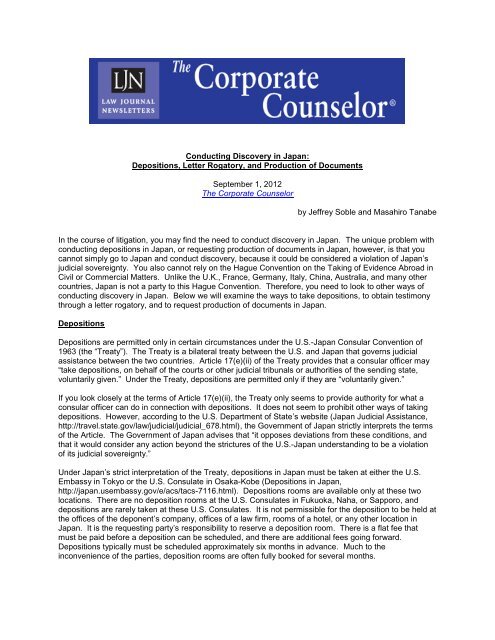The Impact of Technology on the Efficiency of Letters Rogatory Processes
The Impact of Technology on the Efficiency of Letters Rogatory Processes
Blog Article
Letters Rogatory Explained: Facilitating Legal Collaboration Between Countries

Definition of Letters Rogatory
Letters rogatory are formal requests made by a court in one territory to a court in an additional jurisdiction, looking for help in obtaining evidence or testament for a legal proceeding. This step-by-step device is crucial in the context of international legislation, where lawful systems may vary, and cross-border participation is essential. Letters rogatory assist in the event of information that may be critical for adjudicating cases, particularly in circumstances involving complicated transnational problems.
Commonly, these requests occur in civil, criminal, or management issues where an event calls for evidence that lies outside the jurisdiction of the requesting court. The letters function as a method to make certain that the concepts of due process are maintained, enabling courts to access evidence that might or else remain unattainable because of geographical or lawful barriers.
Making use of letters rogatory is governed by worldwide treaties, reciprocal arrangements, or residential legislations, which define the treatments and obligations of the courts involved. It is essential to note that the execution of such demands is not ensured; they depend on the laws and practices of the jurisdiction receiving the letter. Therefore, letters rogatory are an essential tool for promoting legal collaboration and making sure justice throughout borders.
The Process of Issuing Letters Rogatory
Issuing letters rogatory entails an organized procedure that makes certain conformity with both worldwide and residential legal requirements. Originally, the asking for event, typically a court or lawful authority, composes a formal request describing the nature of the support sought, the proof or info needed, and the lawful basis for the request. This file must be exact to help with understanding by the international jurisdiction.

The following step involves transmitting the letters rogatory to the designated international authority. This is often done via polite networks or worldwide legal support frameworks, ensuring that the demand is gotten and acknowledged by the foreign court. The international court after that processes the request according to its very own lawful procedures, ultimately replying to the asking for celebration with the popular information or evidence, thus facilitating worldwide lawful cooperation.
Importance in International Legislation
The importance of letters rogatory in international legislation can not be overstated, as they function as a crucial device for judicial teamwork across boundaries. These formal ask for help in lawful matters enable courts in one jurisdiction to look for info, proof, or the existence of witnesses from another territory, thus facilitating the management of justice in transnational instances.
Letters rogatory are especially important in the context of globalization, where legal disputes commonly span numerous countries. They make it possible for the collection of evidence that may otherwise be hard to reach, making sure that lawful process are notified and reasonable. By cultivating cooperation between judicial systems, letters rogatory help support the regulation of regulation and promote common regard amongst nations.
Furthermore, the use of letters rogatory demonstrates a commitment to global norms and principles of cooperation, reflecting the interconnected nature of contemporary lawful techniques. It highlights the significance of sticking to well established treatments and treaties, such as the Hague Convention, which provides a framework for these requests - Letters rogatory. Inevitably, letters rogatory improve the efficacy of legal processes, making certain that justice is not prevented by geographical borders
Challenges and Limitations
In spite of their value, letters rogatory face several difficulties and limitations that can impede their performance. One main concern is the varying legal structures and procedures across territories, which can bring about misunderstandings and delays in the execution of requests. visit this site right here Different nations might have distinctive needs for the validity of letters rogatory, making complex the procedure better.
Additionally, the frequently protracted nature of international legal collaboration can hinder prompt access to proof or witnesses. This delay might adversely influence continuous investigations or lawful process, specifically in instances calling for urgent action. Furthermore, the lack of sources and training in some jurisdictions can lead to insufficient handling of demands, leading to incomplete or poor reactions.
Countries with much less official legal systems might battle to comply with the step-by-step roughness expected in letters rogatory. These difficulties demand continuous dialogue and reform to improve the efficiency of letters rogatory in legal teamwork.
Instance Studies and Examples

Conversely, difficulties can arise, as seen in a situation entailing a European country seeking proof in an ongoing criminal matter from a non-EU country - Letters rogatory. The process was delayed as a result of bureaucratic obstacles and varying legal requirements, inevitably preventing the investigation
These instances highlight that while letters rogatory can facilitate worldwide teamwork and quicken legal procedures, they likewise highlight the demand for clear interaction and understanding of legal frameworks between nations. Such instance studies underscore the significance of refining this device to improve performance and performance in global legal matters.
Conclusion
In summary, letters rogatory act as a crucial device for facilitating legal cooperation between countries, guaranteeing the collection of evidence and statement across jurisdictions. Their importance in worldwide legislation can not be overstated, as they promote due process and enhance the efficiency of cross-border legal proceedings. Obstacles such as varying political tensions and legal structures might impede their efficiency. Continued efforts to enhance the process and streamline are important for fostering more powerful global judicial partnership.
Letters rogatory are formal demands made by a court in one jurisdiction to a court in another territory, looking for help in obtaining evidence or testament for a lawful proceeding. The requesting event, commonly a court or legal authority, composes an official demand outlining the nature of the support sought, the proof or details needed, and the lawful basis for the demand. The international court after that processes the demand according to its very own legal procedures, inevitably responding to the asking for party with the desired details or evidence, therefore assisting in international legal collaboration.
Furthermore, the use of letters rogatory demonstrates her latest blog a dedication to global norms and concepts of collaboration, reflecting the interconnected nature of modern-day legal practices.Global lawful cooperation via letters rogatory is not without its real-world implications, as highlighted by various situation research studies that highlight both difficulties and successes.
Report this page